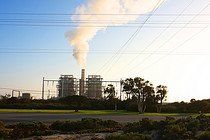Federal appeals court grants stay on Texas EPA rejection
Texas, on Thursday (30th December 2010), reported a new motion in federal appeals court rejecting the Obama administration's attempts to regulate greenhouse gas emissions in the state, and this time an administrative stay was granted.

 Texas, on Thursday (30th December 2010), reported a new motion in federal appeals court rejecting the Obama administration's attempts to regulate greenhouse gas emissions in the state, and this time an administrative stay was granted.
Texas, on Thursday (30th December 2010), reported a new motion in federal appeals court rejecting the Obama administration's attempts to regulate greenhouse gas emissions in the state, and this time an administrative stay was granted.
On Wednesday (29th December) another federal court had rejected the state's appeal.
The state issued a lawsuit against the US Environmental Protection Agency (EPA) to prevent the agency from obliging it to issue greenhouse gas (GHG) permits to its biggest polluters as national carbon rules were due to take effect in January.
The US Court of Appeals for the District of Columbia Circuit granted an emergency request by Texas officials to stay the US EPA plan.
The administrative stay is intended to give the court enough time to consider the merits of the emergency motion for a stay. The judges directed EPA to respond to Texas' request by 6th January, and Texas officials have until 7th January to file any reply to EPA's response.
Until a final ruling is reached on this lawsuit, Texas asked the U.S. Fifth Circuit Court of Appeals in New Orleans to block the EPA's directive that the state expand its pollution regulations to include GHGs. The Fifth Circuit court denied the request on Wednesday.
On Thursday, EPA published in the Federal Register details of its proposed rules for Texas, which were to go into effect on Sunday, 2nd January.
It was after this proposal that Texas officials filed a fresh petition to block the regulations in the U.S. Court of Appeals for the District of Columbia, which generally has authority over federal agencies.
It argues that EPA's enforcement of the new rules is an "improper overreach" that violates the federal Clean Air Act, which it said "declares pollution prevention to be the primary responsibility of states and local governments,' and not the federal government."
Since the US did not ratify the 1997 Kyoto Protocol, the nation has been under no obligation to abide by its regulations. Furthermore, the Obama Administration last year failed to implement ambitious domestic legislation to introduce an emissions credit trading system.
With the Democrats defeated by the Republicans in the midterm elections, taking away President Obama's former Democratic Senate seat, enthusiasm for climate talks diminished in the US. The US rejected ratification of a binding agreement in the 16th Conference of Parties (COP16) held in Cancun, Mexico in December 2010, with the Republicans dominating Congress opposing such a move.
Failure to reach an international treaty in Cancun has meant that national and localised green targets are being relied and focused on worldwide. Texas, however rejects these non binding regulations.
Texas Attorney General Greg Abbott said the state was determined to contest the EPA's intentions. Congress has rejected such carbon rules and the state would contest the EPA's attempts to legislate them itself through administrative rules, he said.
"Texas law does not currently deem greenhouse gases to be pollutants," said Abbott. "Once again, the federal government is overreaching, and improperly intruding upon the state of Texas and its legal rights."
Backed by a 2007 US Supreme Court decision, the EPA issued a finding last year that CO2 and other GHGs endanger human health and welfare.
Since then the agency has advanced the development of rules under the Clean Air Act to limit emissions, which are blamed for climate change. Beginning 2nd January, the EPA planned to impose large emitters such as power plants, refineries and cement makers to obtain permits for emitting GHGs. Plans have now been delayed.
Texas has refused to adopt the rules for emissions. Opponents of the climate rules say they will hurt the economy and kill jobs.
Earlier this year, Abbott said, EPA indicated it would give states one year to implement new GHG limits before taking control of permits.
"The EPA said that, rather than giving Texas even a year, it would unilaterally take over the state's air permitting responsibilities on January 2nd, 2011," Abbott said on Thursday.
The petition from Texas asked the appeals court to step in immediately and halt the EPA's administrative exercise. It was filed on behalf of various state agencies including those overseeing oil and gas, agriculture, utilities and land use.
The EPA labeled Texas's claims as unsubstantiated, and an EPA spokeswoman said neither the letter nor the lawsuit will deter the agency from marching forward with its tailoring rule mandate.
"EPA's measured steps are in response to a Supreme Court decision (EPA vs. Massachusetts) issued more than three years ago," spokeswoman Enesta Jones wrote in an e-mail response to the petition.
Currently, the White House Office of Management and Budget is reviewing a rule that could empower the EPA to enforce federal regulations on GHGs if states choose not to cooperate, anticipating synchronising US national climate efforts.
Further consideration from federal appeals court of the merits of the emergency motion by Texas are awaited.
Author: Marianna Keen | Climate Action
Image: Rennett Stowe | Flickr



_-_frame_at_0m5s_400_250_80_s_c1.jpg)


